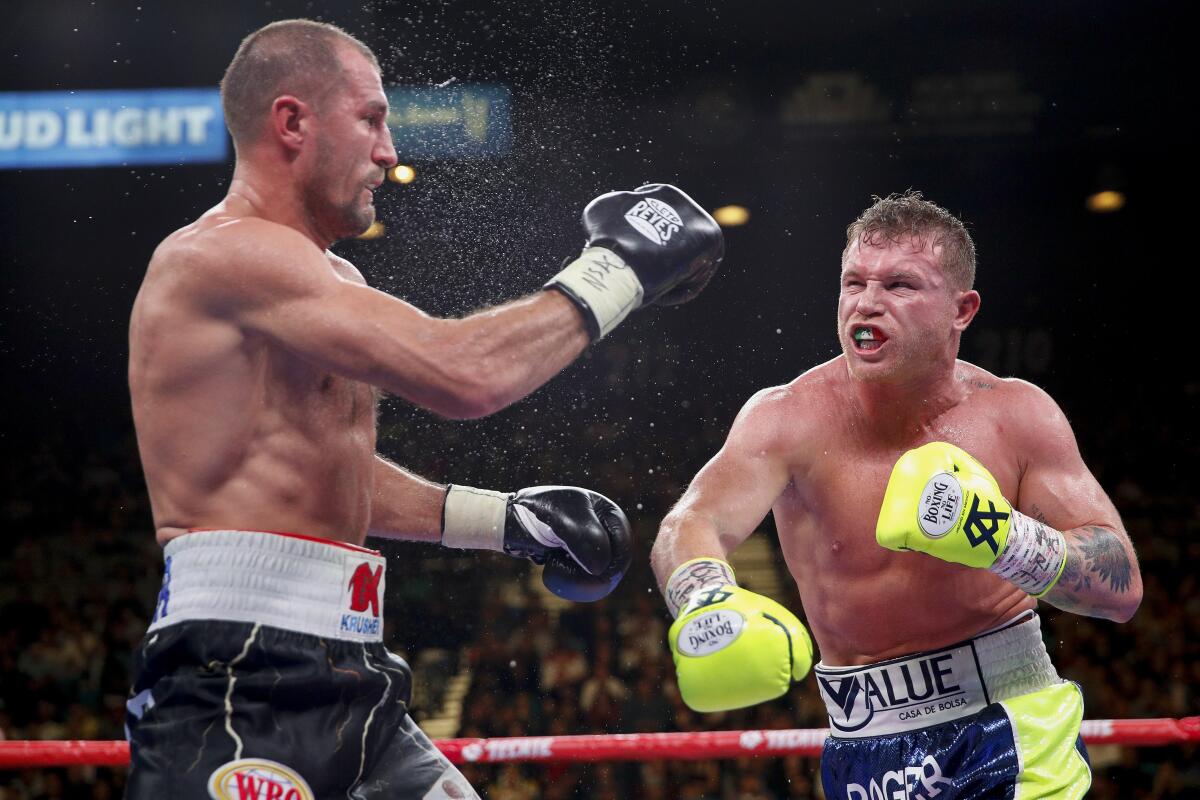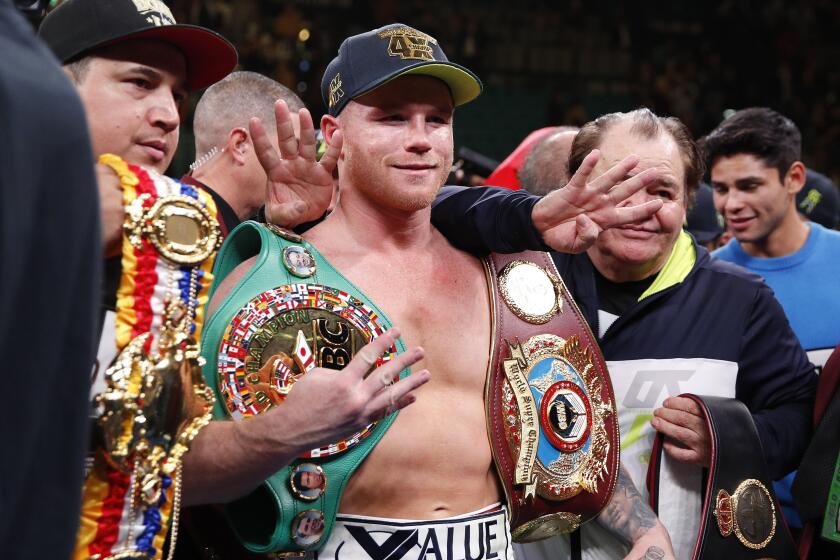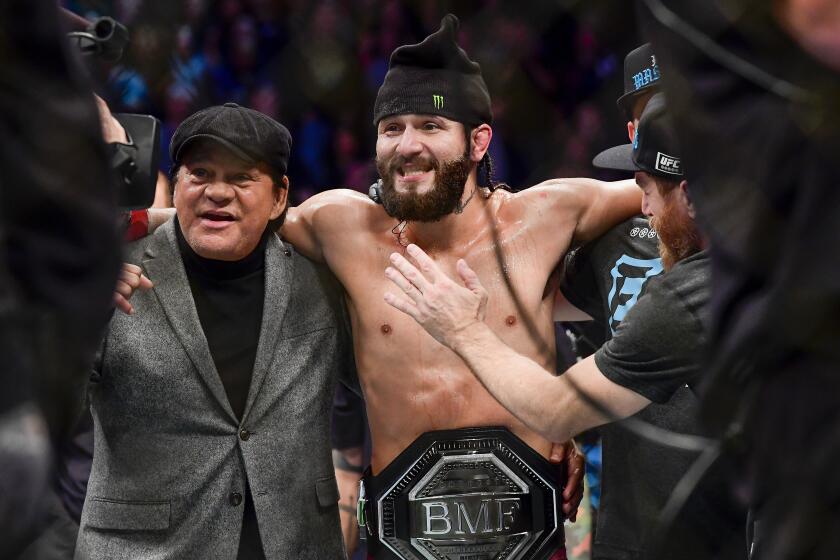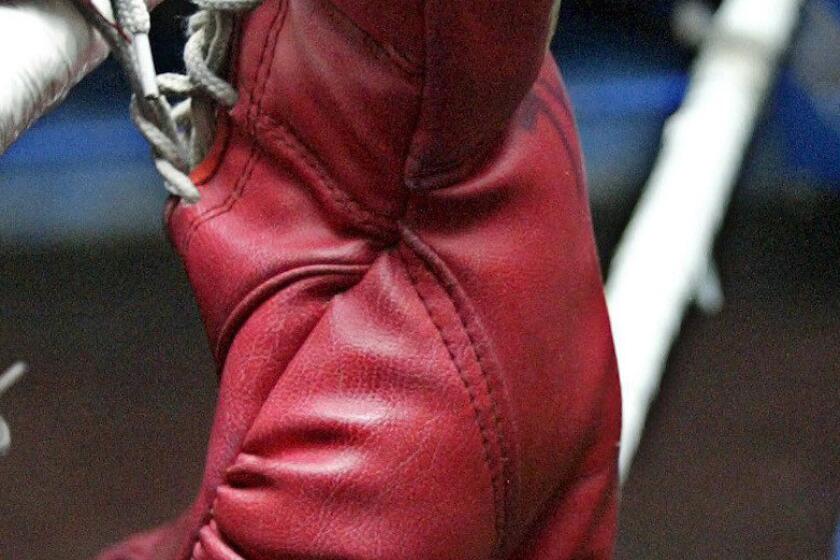Column: Canelo Alvarez is the king of boxing’s wait class

LAS VEGAS — Dwayne Johnson, the actor and former professional wrestler who performs under the moniker The Rock, appeared on the arena’s oversized video screens with what looked like a title belt over his shoulder. Instead of the name of a combat sports sanctioning body or a wrestling organization, the belt was adorned with the letters “BMF.” As a smiling Johnson strode through a partition in the crowd, fans in the MGM Grand Garden Arena stood and pointed their phone cameras toward the walkway leading from the locker rooms to the boxing ring.
Johnson never walked out. Of course he didn’t. He was in New York for UFC 244.
DAZN, the streaming service that broadcasted Canelo Alvarez’s fight against Sergey Kovalev on Saturday night, didn’t want its main event to overlap with the mixed-martial-arts card. The MGM Grand had a choice. Anger its customers by forcing them to stare an empty boxing ring or show on its screens the UFC match between Jorge Masvidal and Nate Diaz. The decision makers elected to show Masvidal’s victory.
Over the three rounds that were required for Masvidal to stop Diaz on cuts, Alvarez waited on a black couch in his locker room. Alvarez might be the so-called A-side on every one of his fights, but his sport was relegated to the B-side on Saturday night.
Canelo Alvarez of Mexico added the WBO light-heavyweight title to an already rich resume by knocking out Sergey Kovalev in the 11th round late Saturday.
The bizarre scene unfolded on what is the Day of the Dead in Mexico, which was entirely appropriate. Alvarez’s 11th-round technical knockout of Kovalev might as well have been boxing’s memorial service. Regardless of whether DAZN understood the implications of delaying Alvarez’s ring entrance, its decision was an acknowledgment of what others already have known: Mixed martial arts is the new king of combat sports.
Alvarez isn’t just any fighter. He’s boxing’s top attraction. He delivered an electrifying performance against Kovalev to win a version of the light-heavyweight championship, landing a thunderous right hand on the Russian’s jaw to send him crumbling into the ropes and ending a fight that appeared to be close entering the 11th round. Alvarez was nonetheless subjected to an indignity which the likes of Muhammad Ali, Ray Leonard, Oscar De La Hoya and Floyd Mayweather never experienced.
The sport’s diminished stature was obvious in the buildup of this contest. The typically festive weigh-in the day before was especially striking. The crowd was small and lacking in enthusiasm. On the night of the fight, blocks of 12 seats still could be purchased at four of the six ticket-price categories, including the three least expensive. Even when Alvarez fought, there were patches of empty seats in parts of the arena.
The developments were alarming to people working in the sport who were unaffiliated with the promotion.
Stephen Espinoza, the president of Showtime Sports who was in town to spread the word about a future show his network will televise, acknowledged he was worried.
Cuban fighter Jorge Masvidal dominated Nate Diaz at UFC 244, but he wasn’t happy when their welterweight bout was stopped via third-round TKO.
Espinoza called this a “year of adjustment” for boxing, as a significant percentage of broadcasts moved to online streaming platforms such as DAZN and ESPN+. Showtime’s longtime premium cable competitor, HBO, is no longer in the boxing business.
Though many in the sport are encouraged by the influx of new capital, it was a source of concern for Espinoza.
“There have been others in this market that have been very open that they’re getting into sports streaming and using boxing as a stepping stone,” Espinoza said. “So that doesn’t speak well to their treatment of the sport and their long-term commitment to the sport. What’s going to happen here? You’re going to leave behind a trail of expectations and everyone else cleans up the mess when these people are gone.”
Espinoza had a vested interest in making that argument, but that didn’t make his points any less legitimate. He also made an astute observation about the oversaturation of the market.
“There’s too much boxing on TV, too much boxing available,” he said. “When you are doing the number of fights that are being done across the market, it’s hard to enforce a standard of quality. There’s a tremendous amount of noise in the marketplace. Unless you’re the hardest of hardcore fans, it’s hard to figure out which are the big fights, which are the medium fights, which are prospect fights.”
Espinoza added, “It’s as if we’re televising every minor league baseball game on a national basis.”
And the sport might have cried wolf — or cried big fight — one too many times.
Don Fraser, a longtime L.A. boxing promoter who earned a reputation for a colorful wardrobe and off-beat promotional gimmicks, died Wednesday at home in Toluca Lake.
“There’s no sport that exists that lies to its fans as much as boxing,” Espinoza said. “The announcers lie, the promoters lie and it’s not healthy. College football doesn’t sell every single game as Alabama-LSU. Not every NFL game is the Super Bowl. Sometimes, it’s just a game. I think we do a disservice when we try to sell something as one thing and it’s not.”
Boxing has problems. Of course it does. It always did and always will. What was new was the magnitude of these problems, with the dysfunction now at a scale at which it affects even the sport’s most popular fighter.
What boxing received this week was more than a warning. That was a death certificate.
More to Read
Go beyond the scoreboard
Get the latest on L.A.'s teams in the daily Sports Report newsletter.
You may occasionally receive promotional content from the Los Angeles Times.














